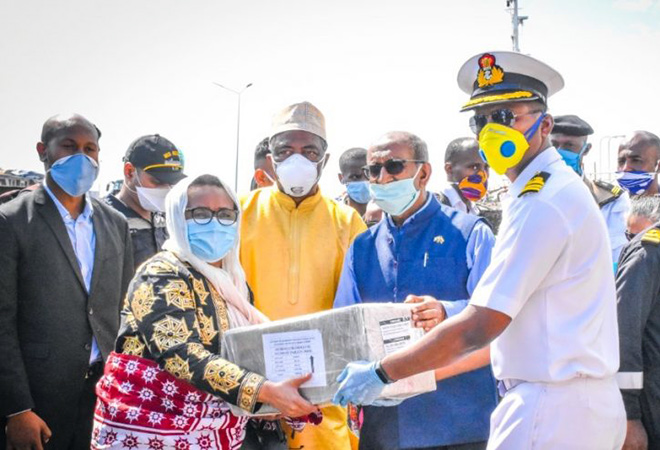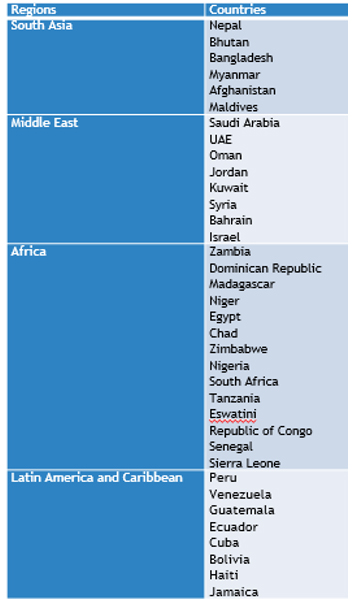-
CENTRES
Progammes & Centres
Location

Since the WHO declared COVID -19 as a pandemic, it has become a defining crisis of our time. Indian Prime Minister Narendra Modi, on 12 May 2020, stated that while India believes in self-reliance, it does not agree with self-centric arrangements, while refereeing to the ancient Sanskrit dictum Vasudhaiva Kutumbakam, meaning ‘the world is one family’. This philosophy has guided India’s cooperation with more than 123 countries.
India’s international cooperation is an answer to the United Nations Secretary-General’s call for world leaders to come together for an urgent and coordinated global response. This cooperation has been termed as ‘medical diplomacy’ by eminent political commentators. The countries, India has reached out to, mainly belong in the global south as listed under the Group of 77+ China, possessing limited capacities to manage the epidemic. Hence, such engagements must be analysed through the lenses of South South cooperation (SSC).
SSC between emerging economies is demand driven and mutually beneficial for the member countries. Grants, capacity building, trade, development finance, and technical cooperation are some of the modalities of SSC.
In the wake of this pandemic, India has advocated availability of medicines across the globe through international cooperation and development partnerships. Notably, India signed a UN resolution to ensure fair and equitable access to essential medical supplies and vaccines developed to fight COVID-19.
India’s recent efforts to export Hydroxychloroquine (HCQ) to affected countries around the world is based on India’s history of medical diplomacy. As per reports dated 30 April, India has provided 2.8 million HCQ, to 25 countries, and 1.9 million paracetamol tablets to another 31 countries as part of its grant assistance to countries fighting COVID-19. India is gearing up to meet the needs of nearly a hundred countries over the next few weeks. This diplomatic initiative is expected to cost INR 1.1-1.2 billion.
Additionally, consignments of HCQ and paracetamol are being exported to 87 countries. This can be classified under trade modality of SSC. Multilateral agencies such as UNICEF too have been provided with global supplies by India. The UN Secretary General “saluted” nations like India for extending solidarity across borders in the fight the devastating pandemic.
Adhering to the ‘neighborhood first’ policy, India has sent the HCQ tablets to Afghanistan, Bhutan, Bangladesh Nepal, Maldives, Mauritius, Sri Lanka and Myanmar. Furthermore, Indian military doctors have been deployed in Nepal and Maldives to support that local management in their response to COVID-19 On 15th March, during the first video conference among the heads of states of the SAARC countries, the Indian Prime Minister proposed the creation of a SAARC COVID-19 emergency fund. To this end, he also pledged USD 10 million as India's contribution for the fund, thus assuming the leadership of the region’s charge against the pandemic.
India is simultaneously strengthening ties with the Middle East by supplying HCQ tablets to Saudi Arabia, UAE, Oman, Syria and Jordan among others. UAE and Saudi Arabia are two of India’s key trading partners. Additionally, the recently signed MoUs focuses on strengthening bilateral engagements in the health and medicine sectors. India has also discussed COVID-19 mitigation measures with Jordan while the country has deployed medical professionals in Kuwait.
In April, as a part of an ‘Africa-focus working day’, the Indian External Affairs Minister held a series of conversations with his counterparts of Nigeria, Niger, Burkina Faso, Uganda and Mali, and promised support and medical assistance. Subsequently medical assistance was provided to another twenty African countries. India, which has been a major exporter of medicines to Africa even before the coronavirus pandemic, has been exporting drugs and medical devices on a humanitarian basis, living up to its status of being “pharmacy to the world”. Further, the Indian PM took personal initiative to call beside others, Heads of State of Egypt, Uganda and South Africa, to assure support in combating the pandemic. This is especially relevant given the India-Africa Summit.
As a part of India’s efforts to support Caribbean and Latin American countries, India had pledged five million HCQ tablets for 28 countries as grants. Brazil, Argentina and Colombia, have temporarily scrapped import duties on specific respiratory equipment from India whereas Colombia, Paraguay and Ecuador, have done so on medical equipment such as gas masks and oxygen therapy devices.
As per reports, India will be donating 4000 HCQ tablets as grants and providing 19,200 tablets on commercial basis to Jamaica. This comes after India had committed US$ 1 million grant funding for community development projects in Jamaica in the India- CARICOM 2019 summit.
Table 1: India’s ongoing medical assistance to Southern partners. Such assistance include supply of drugs, testing kits and other medical assistance.
 Source: Hindustan Times
Source: Hindustan Times
Apart from providing medical supplies through grants and commercial means, India has also been facilitating the transfer of skill and knowledge to medical professionals through the capacity building modality of South South Cooperation. Indian medical staff has been conducting online training for their counterparts from other SAARC, Caribbean and Latin American countries.
"Apart from providing medical supplies through grants and commercial means, India has also been facilitating the transfer of skill and knowledge to medical professionals through the capacity building modality of South South Cooperation."
According to UN Office of South South Cooperation, India, Brazil and South Africa’s Facility for Poverty and Hunger Alleviation (IBSA Fund) that works towards supporting key e-Learning project to improve health-care coverage and quality in the northern Vietnam has proven to be successful in reaching health-care workers in remote medical settings as a part of their response to COVID-19.
In addition to extending support to the global South, India has also reached medical supplies to developed Northern countries such as USA, Spain, Bahrain, Germany and the United Kingdom under commercial agreements signed with Indian pharmaceutical companies. This is notable, given the infamously stringent pharmaceutical standards set by these countries.
Given limited resources and huge domestic demand, India’s leadership in the global contest during the pandemic has earned India well-deserved goodwill. These efforts can be contrasted with the Chinese providing medical supplies and equipment including test kits, which have been less than effective on many occasions. Given the predicament, India’s medical diplomacy is enabling India to emerge as a responsible and reliable player during a time when many established international actors have failed to do so.
"Given limited resources and huge domestic demand, India’s leadership in the global contest during the pandemic has earned India well-deserved goodwill. These efforts can be contrasted with the Chinese providing medical supplies and equipment including test kits, which have been less than effective on many occasions."
In a post COVID-19 world, India’s has a comparative advantage in becoming a reliable provider of global public-goods and services in healthcare. India’s pharma industry is the third largest in the world. According to the Government of India, 18% of the world’s generic drugs are supplied by India. It is also a leading producer of vaccines in the world and contributes to about 50% of global vaccine demands. This high demand is due to lower pricing. India’s existing advantage of large-scale pharmaceutical production allows it to significantly leverage its initiatives under SSC in supporting the growth of the healthcare sectors of other nations by:
With Union Health Minister Dr Harsh Vardhan appointed as chairman of the WHO Executive Board, India is expected to play a pivotal role in strengthening WHO to deal with future pandemics by promoting international cooperation.
As the pandemic rages through the world, transcending geographical boundaries, it has taught humankind the need for Atma Nirbharata (Self-reliance), as the Prime Minister underlined in his national address last week. Self-reliance which is not self-centric, but looking inwards to explore and delve into the strength within so that the fruits of your labour can be a boon to the world.
The views expressed above belong to the author(s). ORF research and analyses now available on Telegram! Click here to access our curated content — blogs, longforms and interviews.

Kaustuv Chakrabarti is the National Consultant for Research and Documentation at the Food and Agriculture Organization of the United Nations in India. He is a ...
Read More +